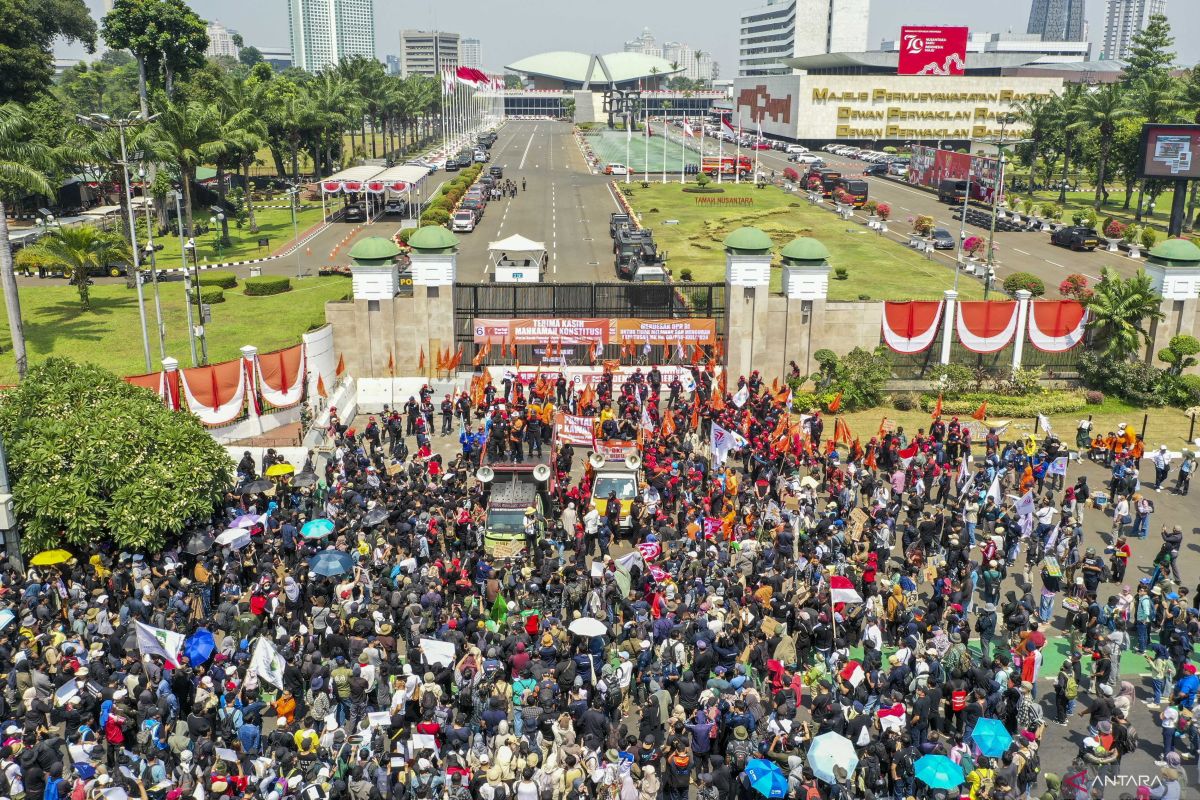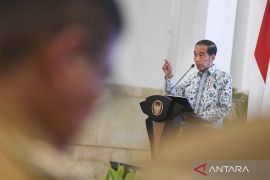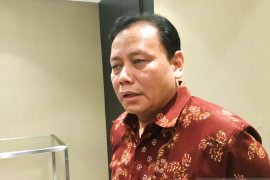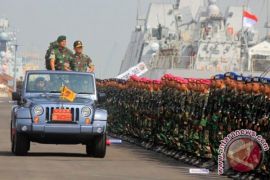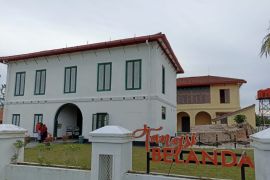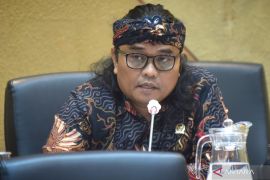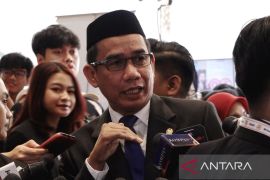The image, which originated from a short fictional film, quickly went viral, driven by influencers and people expressing concern over the state of the Indonesian democracy.
On Thursday, dozens of activists, students, civil society members, and professors laid wreaths outside the Constitutional Court in support of its decision. They expressed gratitude for the Court's role as the guardian of the nation's Constitution.
"Honorable Constitutional judges, today, we are even more grateful for your restoration of not only the Constitution's dignity but also our rights, particularly democratic rights in political competition," politician Wanda Hamidah said.
Hundreds of students from various backgrounds held a peaceful rally at the Heroes Monument in Surabaya to support the Constitutional Court's decision and oppose dynastic politics that could potentially arise in the 2024 Regional Elections.
Public figures, such as film director Joko Anwar, top actor Reza Rahadian, and popular comedians, also gathered in front of the parliamentary complex in Senayan, Jakarta, to express their aspirations and defend the Constitutional Court's ruling.
"We are here to show solidarity because we are tired of our representatives in the House of Representatives not representing the people's voice," Arie Keriting, a prominent comic, said.
Those who took to the streets had experienced a glimmer of hope when the Constitutional Court on Tuesday revised the threshold for nominating candidates for regional head and deputy regional head posts through Decision Number 60/PUU-XXII/2024.
The court amended Article 40(1) of Law No. 10 of 2016, which required parties to either gain 25 percent of the vote share or 20 percent of the Regional Representative Council (DPRD) seats to nominate candidates.
The ruling allows political parties without DPRD seats to nominate candidate pairs. The court determined that the number of valid votes in a region will solely determine the eligibility of political parties or coalitions to propose candidates.
The new thresholds will be based on a province's or district's voter population and will range from 6.5 percent to 10 percent.
The Constitutional Court decision will not only have an impact on candidates such as Anies Baswedan or the PDIP, who were left by the large coalition in the Jakarta election, but will also create broad political movements and dynamics for candidates who have not had a chance in existing coalition building, an observer said.
The ruling is also expected to create new opportunities for regional head candidates who had earlier given up hope of securing a party nomination. Further, the court's decision could allow such candidates to find parties willing to support their bids.
"Due to the prevalence of large coalitions, many candidates have faced limited opportunities," Aditya Perdana, a political science lecturer at the University of Indonesia's Faculty of Social and Political Sciences (FISIP UI), explained.
Related news: UI professors urge parliament, government to comply with MK ruling
However, the Legislative Body (Baleg) of the House, during a rushed meeting on Wednesday, partially accommodated the Constitutional Court's (MK's) decision changing the election nomination threshold.
However, the meeting agreed that the change would apply solely to non-parliamentary parties or those without seats in the Regional House of Representatives, or DPRD.
"This actually adopts the Constitutional Court's decision that accommodates non-parliamentary parties in the regions. Thus, they can also register with the KPU (election commission), which they previously could not," Deputy Chairperson of the DPR, Baleg Achmad Baidowi, who led the meeting at the parliament complex, said in Senayan, Jakarta, on Wednesday.
He added that parties that have seats in the DPRD will still have to follow the old rules of a minimum of 20 percent of the DPRD seats, or 25 percent of the valid votes.
Not only that, the DPR agreed to reset the minimum age for regional head candidates based on the Supreme Court (MA) ruling.
As per the ruling, the minimum age needs to be calculated as on the date of inauguration.
With the approval, the minimum age for gubernatorial candidates will be set at 30 and for regent and mayoral candidates at 25.
The debate centered on whether to follow the MA decision or the Constitutional Court's decision, which calculates the candidate's age as on the date of registration.
Gerindra faction member Habiburokhman supported the MA decision, while PDI Perjuangan faction member TB Hasanuddin favored the MK's ruling.
"In theory, the candidates' age limit should be determined at the time of registration, which is logical," Hasanuddin said.
The MK's decisions on Tuesday have significant implications for regional head nominations and age limits.
However, the DPR decision on Wednesday could significantly affect candidates like Kaesang Pangarep, who is being backed by the Coalition for Advanced Indonesia (KIM) Plus for the 2024 Central Java gubernatorial election.
The coalition plans to support Ahmad Luthfi and his running mate, Kaesang, the youngest son of President Joko Widodo, in the upcoming election.
Initially, Kaesang's eligibility was uncertain due to the Constitutional Court ruling that set the minimum age for gubernatorial and vice-gubernatorial candidates at 30 years at the time of registration.
Born on December 25, 1994, Kaesang will meet the age requirement by the time elected governors are sworn in on January 1, 2025.
Under the previous regulation, he would not have been eligible to contest since the General Elections Commission (KPU) was scheduled to announce eligible candidates on September 22, when he would still be 29 years old.
Following the controversial decision, the Indonesian National Police deployed more than two thousand personnel to secure the protest rally in front of the DPR/MPR RI building.
However, even as masses from various elements flocked to the front gate of the parliament building, the House of Representatives' plenary session to ratify the revisions of the Law on Regional Heads' Election, planned on Thursday morning, was called off over a lack of quorum.
"We will call for another meeting of the parliament's Legislative Body to reschedule the plenary session due to the current lack of quorum," DPR Deputy Speaker Sufmi Dasco Ahmad announced while presiding over the plenary session here.
The deputy speaker promptly stroked his gavel to end the session. Members of Parliament then withdrew from the plenary hall.
Ahmad said that the plenary session was attended by just 176 MPs, with 89 joining the session in person and 87 attending it remotely.
The number was below the quorum, set at 50 percent plus one of the DPR's 575 members. The quorum was also not satisfied as not all party factions were present at the meeting, as required by parliamentary rules.
As evening approached, the crowds remained defiant in front of the parliamentary complex, continuing to defend the Constitutional Court's decision despite the police's attempts to disperse them with tear gas.
Related news: DPR partially adopts MK's decision on regional election threshold
Editor: Rahmad Nasution
Copyright © ANTARA 2024
